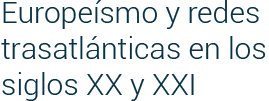Home
EUCLIO II
Europeanism and transatlantic networks over the 20th and 21st centuries
PGC2018-095884-B-C21/C22
Regarding the European integration process, the classic historiography has dodge the importance of transnational bonds and the influence of debates and previous experiences in diverse cultural areas. The transnational history development and the study of the diverse relationships spheres and the dynamics established between people, ideas, goods and capitals will enable to overcome a reductionist story and to present a more complex analysis on the process of European construction.
After the experience gained in 2016 in the research project “Making the Europes: Identities, Europeanization, external projection and Spanish national story in the process of European integration” (HAR2015-64429-MINECO/FEDER), 19 researchers from 12 universities in 5 countries participate in EUCLIO 2, focusing this new project “Europeanism and transatlantic networks over the 20th and 21st centuries” (PGC2018-095884-B-C21/C22) within the following research lines: the institutionalization process of cultural Europeanism; the educational debates in international organizations; the European values and culture in current school curricula; the transatlantic networks of confessional nature and their impact on Europeanism; the transatlantic networks and their impact on youth organisations in Europe; the promotion of cultural tourism in Europe; the leading role of some Spaniards in the Europeanism transatlantic networks; the role played by Spain and Europe in the Ibero-American integration processes (Mercosur, Pacific Alliance, Central American Integration System); and the influence of Eurosceptic narratives, with the British case as a paradigm.
EUCLIO 2 is, therefore, a privileged tool to disseminate the studies, debates and results of our research.

